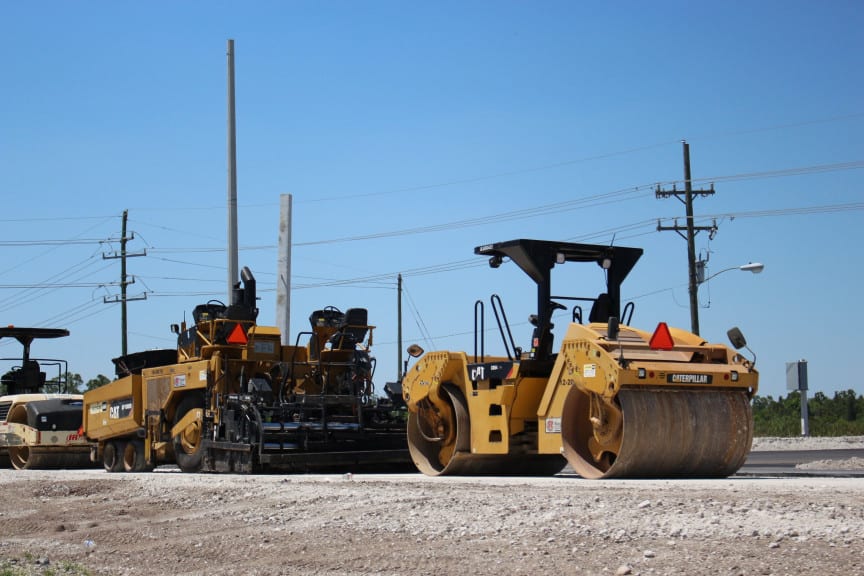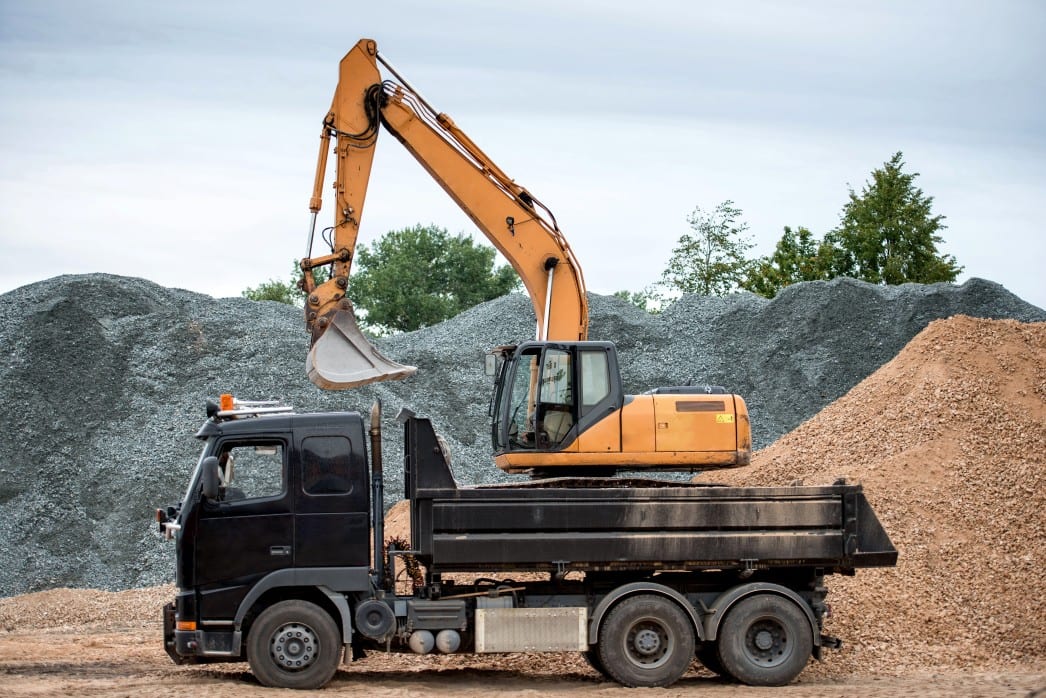Transporting heavy equipment is not an easy task, especially if you do not have the right transportation assistants by your side. Fortunately, we can responsibly handle any type of heavy equipment and transport it to the intended destination safely, securely, and fast regardless of how far you need your heavy equipment to transport.
Heavy equipment comes in all different shapes and sizes. From small construction equipment to massive tractor trailers, harvesters, forwarders, combines and other farm equipment, to airplanes and helicopters, nothing is impossible to transport with us. Ask for a free price quote now through the form on this page!
How to Transport Heavy Equipment
The process is quite simple and involves the following steps:
STEP #1: Get a Quote
Use our Heavy Equipment Transport Quote Form on this page and one of our friendly and experienced logistics experts will contact you to discuss the particularities of your heavy equipment transport needs.
If you are satisfied with your price quote and decide to transport your heavy equipment with us, we may require that you submit some documents before the shipment takes place, especially when transporting your machinery overseas. Among these documents might be:
- A notarized bill of sale or certificate of title to prove ownership of the heavy equipment.
- Dimensions and specifications of the heavy equipment being transported.
- A power of attorney form that will give the freight forwarder the legal right to handle their shipment.
- Identification of both the receiver and shipper.
STEP #2: Determine your Dimensions
We require to know the exact dimensions of your heavy equipment to pair it with the best trailer type. So, measure your heavy equipment:
- Length (generally, between 48-65 feet)
- Height (the standard is 13 feet 6 inches)
- Weight (80,00 gross vehicle weight is allowed – after that, you pay oversize fees and penalties)
- Width (the standard is 8 feet 6 inches).
To determine the weight of your equipment, it is better to measure the heavy equipment yourself to give us the most accurate results. This will help us provide you with the best possible transport experience. Knowing your heavy equipment’s dimensions will also help determine whether your machinery complies with the regulations of the states in which it will travel.
STEP #3: Select the Best Type of Transport Trailer
After providing the precise dimensions for your heavy equipment, time to select the best trailer, driver, and truck to haul your machinery. Our logistics specialists will determine these based on the information you have given us. The majority of heavy equipment is transported on a flatbed hauler (aka lowboy trailer). Exactly what machinery you need to be shipped will contribute to making the final decision as to which type of truck to use to transport your heavy equipment, though. Rest assured that we will find the ideal carrier for your requirements.
We have a long-standing reputation in heavy equipment transportation and know not only hundreds of highly qualified drivers but also how to load, ship, and unload your heavy equipment securely and safely.
STEP #4: Prepare your Heavy Equipment for Transport
This entails washing your heavy equipment to remove the mud that will add weight to the haul (and increase the driver’s fuel cost). Besides, the driver is held legally liable for anything that flies off their trailer, including debris and rocks. So, washing your machinery ensures a safer and less expensive transport.
Also, check the manufacturer’s instructions on how to prep your heavy equipment for transporting. Most manufacturers suggest latching doors closed and disconnecting batteries for added safety.
Other than that, you need to:
- Cover the smokestacks on your machinery and secure the covering tightly.
- Adjust hoists and booms to comply with height regulations. Also, position bulldozer blades properly (you may have to detach them per the state’s rules) and make sure your excavators get knuckled under.
- Select a loading spot that will enable the truck-and-trailer to load the heavy equipment (choose a level spot to load and unload). There should be sufficient overhead space for safe loading too.
STEP #5: Receive your Heavy Equipment
Have someone pick up the heavy equipment when it reaches its intended destination. For any queries or questions, please do not hesitate to contact our transporting specialists. We are always here to help you with your heavy equipment shipping needs and do everything humanly possible to address any concerns you may have in the most efficient way.
How Much Does It Cost to Transport Heavy Equipment?
This is not a question that can be answered easily. Compared to standard transporting services, heavy equipment transport is more expensive due to fuel costs (the heavier equipment requires more stops at the pump) and the relative lack of demand. Exactly how a particular shipment with cost can be challenging at times. Nevertheless, factors like the weight and dimensions of the heavy equipment inevitably affect the price, which makes sense given that transporting larger and heavier equipment increases the gas and handling demands.
The transporting method plays a role in determining the total price of shipping your heavy equipment as well. The cheapest and most commonly used transportation method is roll-on-roll-off (RORO) and is ideal for self-propelled or wheeled equipment, which is driven onto the vessel and then strapped to the deck.
Containers (20 feet or 40 feet) are great options for static (non-moving) heavy equipment that can be dismantled for transport and then reassembled when they reach the destination port. Dismantling services are extra costs that you can save if you disassemble the cargo yourself. Finally, flat racks are recommended for transporting particularly large equipment, and is the most expensive option of all.
Do not worry, though. We collaborate with multiple companies that ship heavy equipment and have formed business relationships with them over time that allow us to offer the most competitive price quotes in the current market.
So, fill out the free Quote Request form, and you will receive a customized price quote for your heavy equipment within 30 seconds. If your type of heavy equipment is not on our list, do not panic. This does not mean that we cannot help you transport it. We only list the most commonly transported heavy machinery. Contact us and speak to a Customer Service agent or call us 24/7 at (800) 930-7417. Our shipping representatives will be more than happy to assist you in getting a quote and provide the needed direction and advice so you can decide on the best transportation option (based on your type of equipment and individual budget) and transport your heavy equipment the soonest possible!
How Much Time Does It Take to Transport Heavy Equipment?
The distance that needs to be traveled plays a vital role in how much time it takes for heavy equipment to arrive at the port of destination. Other than that the delivery time is also affected by:
- The mode of transport – Transportations from dock to truck to dock take longer in the case of an LTL shipment. Also, transporting via train is more time-consuming than via truck.
- Oversized loads – We need to comply with jurisdictions’ regulations. Certain oversized loads require special permits. In some states, we may even be obliged to put an escort car to help the truck go through these states. This could slow things down a bit.
- Special regulations – Some states do not allow wide or oversized loads to run at night or on the weekend.
- Electronic logging devices (ELD) – According to the law, drivers must track their hours of service using ELD. When they reach a certain hour-limit driving, they need to rest for a specific amount of time before they can hit the highways again. This is to ensure the safe transport of goods.
Fill our the estimate request form on this page to get a rough time estimate of your transport.
Types of Heavy Equipment We Can Transport
Airplanes
Articulated Trucks
Backhoes
Bulldozers
Cement Trucks
Cold Planers
Combines
Continuous Miners
Crawler Tractors
Dump Trucks
Excavators
Forklifts
Paving Equipment
Helicopters
Industrial Loaders
Motor Graders
Knuckleboom Loaders
Planes
Road Reclaimers
Road Rollers
Telehandlers
Water Trucks
And much more!
If you do not see your equipment listed above, don’t fret. Give us a call anytime at 800-930-7417 and speak to a live agent. They can also help you get your quote, give advice and direction, and help you get what you need to transport your heavy equipment today.
Tips on Transporting Heavy Equipment
You should be able to answer some key questions (or discuss them with the transportation specialist) before you can transport your heavy equipment. For instance, is your machinery oversize and requires special handling? Do you need to hire a forklift or crane (also, on both the delivery and pickup)? Does your equipment need dismantling to fit on a trailer? Do you need help unloading or loading the equipment (i.e., require a dock to load or unload)? Is your load fragile? How will you strap it down to the truck?
It should be noted that even with the best preparation and planning, unexpected things can happen (i.e., the need for special permits, bucket trucks, pilot cars, or additional escort services). The truck or trailer driver may also be forced to take a different route due to unexpected construction zones. This affects not only transit time but also the total cost.
The weather and any clearance considerations that might be required can again come into play. Being prepared for instances that could not have been foreseen is the best thing you can do when you ship your heavy equipment.
What to Expect When Transporting Your Heavy Equipment
It will typically take longer to transport heavy equipment than a standard car for several reasons. For one, the heavier equipment reduces fuel economy, which means more stops at the pump.
Heavy equipment transportation also costs more than standard shipping services for the same reasons. Couple this with a relative lack of demand and prices can get high fast.
Thankfully, we at American Auto Shipping work with companies that ship heavy equipment for a living. We can get you a competitive quote to transport your heavy equipment, often at costs that are beneficial to everyone without breaking the bank.
If your heavy equipment is not on tracks or wheels things get a bit trickier, but it won’t be impossible to find transportation services for them. Make sure to speak to an agent for more information about heavy equipment transportation for vehicles without tracks or wheels.
Have a question about transporting your heavy equipment. Give us a call anytime day or night at (800) 930-7417 or fill out our Heavy Equipment Transport Quote Form on this page and one of our transport experts will get back to you pronto!
- When to go with an Enclosed Transport - October 2, 2023
- Understanding California’s EV Mandate - August 1, 2023
- Top Reasons Auto Shippers Are Delayed - January 9, 2023

